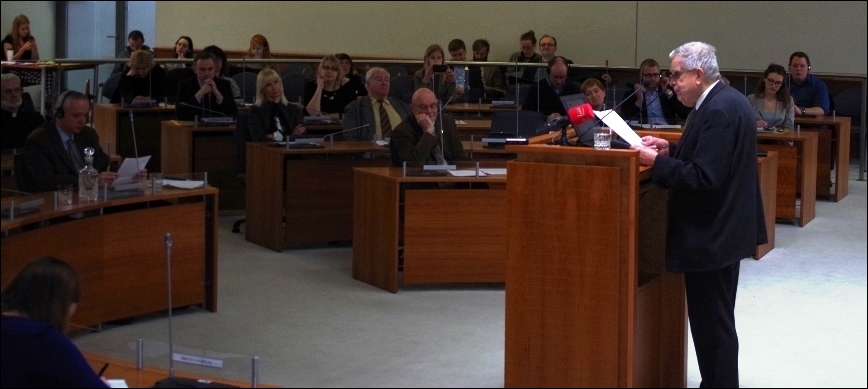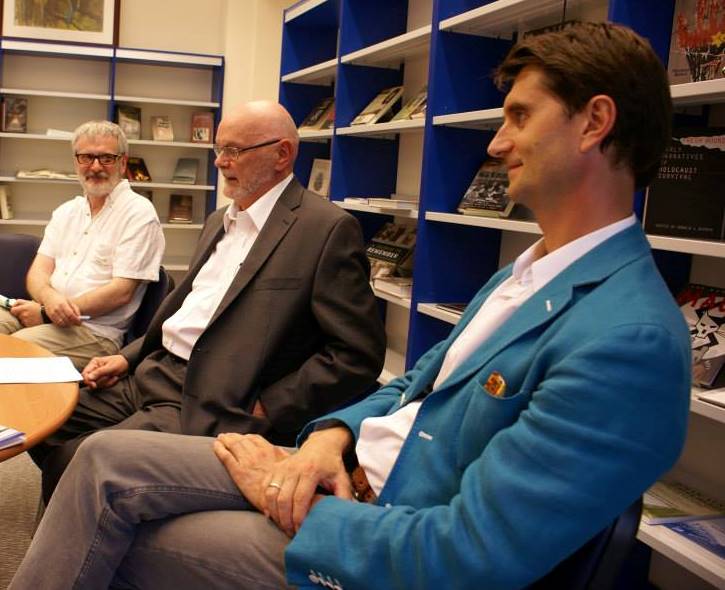[last update]
◊
see also: BOOKS SECTION
[last update]
see also: BOOKS SECTION
◊
Rachel Kostanian-Danzig, one of the founders of the Vilna Gaon Museum of Jewish History, is celebrating her venerable ninety-first birthday. She belongs to the generation that survived the horrific years of the Second World War as well the times of the Soviet regime, and saw the fall of the Iron Curtain: the geopolitical “earthquake” that allowed Lithuania to take back control of its own history.
During her youth in Soviet times, Rachel completed a law degree at Vilnius University and qualified as an English teacher at the city’s Pedagogical University. Her field was not history, until the breakup of the Soviet Union and the rise of Lithuanian liberty gave her the freedom to immerse herself in the history and culture of her Jewish people. But no historian’s diplomas could match her relentless, painstaking and passionate desire to meaningfully fill the gaps in Lithuanian collective memory. Today’s young professionals could envy her enthusiasm and “engagement.”
◊
The well-organized conference “Antisemitism, Radicalization and Violent Extremism” was held on 30 September 2015 at Vilnius’s Novotel Hotel by the Human Rights Monitoring Institute (HMRI) with partners (see program). It will go down in history as one of the most remarkable capers yet in the fraught local “Dead Jew Business,” as it is increasingly becoming known. The biggest shock of the day was that one of the three keynote morning session speakers was Swedish-born Lithuania-resident filmmaker Jonas Ohman, known in town for his (far right style) glorification of postwar resistance fighters — one of the most painful issues of Baltic antisemitism in the twenty-first century — without the slightest mention of the alleged Holocaust perpetrator background of the precise figures glorified.
But the film maker chosen for the morning session manages at the same time to also be a (far left style) Israel baiter, whose current “humanitarian project” is a petition asking the mayor of Vilnius to sack a Jewish (Israeli-Lithuanian) advisor on the basis of social media “silly photos” that become bacteriologically antisemitic when recycled in his own petition, and beyond, in its recontextualized, politically charged incarnation. Far from doing the same to counter officials and advisors with neo-Nazi links, he boasted in his talk (amateur video) of his links to Right Sector and other Ukrainian groups that adulate wartime Holocaust perpetrators. When he was trashing Israel, the Israeli ambassador to Lithuania, Amir Maimon, sitting in the hall, boldly called out a question: “Are you rewriting the history?” (at time code 13:31).

Tomas Venclova addresses Ruta Vanagaite’s conference at Vilnius City Hall on April 17, 2015. Photo: Julius Norwilla.
This opinion piece and eyewitness report by Geoff Vasil relates to the July 10th event in honor of the Red-Brown Commission held at the Vilnius Jewish Public Library. See related reports on the library’s instrumentalization as a PR platform for the Commission and the more or less contemporaneous announcement of the Commission’s resumed activities, in the absence of apologies to Yitzhak Arad, Pinchos Fridberg, and the other accused Holocaust survivors.

Attendees at the July 10, 2013 event to honor the “International Commission for the Evaluation of the Crimes of the Nazi and Soviet Occupational Regimes in Lithuania” were treated to speeches and plentiful Katz-bashing by (from right) Ronaldas Račinskas, Saulius Sužiedėlis and Ilya Lempertas.
The run-up to next week’s controversial Lithuanian-government sponsored conference on Lithuanian Jewish issues in London, which is sowing enough confusion as it is, was put into further disarray as it emerged that an email received by hundreds of people (from various forwarders) is apparently part of a curious hoax. The only discernible purpose seemed to be bring discord into the fragile ranks of the surviving Litvak camp by spreading a set of “symmetrical” false rumors.
Some of the emails were identified as originally coming from an official of an NGO, “Maceva” that is dedicated to the laudable cause of maintaining Lithuanian Jewish graveyards, but it is increasingly thought that this shocking attribution could well be part of the hoaxter’s agenda, and that an unambiguous denial — or apology —will be forthcoming from Maceva’s board of directors at the earliest possible opportunity.
The major two — actually three — pieces of disinformation being disseminated are:
by Dovid Katz
The Lithuanian Holocaust broke out in the week of 22 June 1941, when the Nazis attacked the Soviet Union; it is the week when, in many locations, so-called ‘patriots’ and ‘rebels’ in large numbers began to humiliate, plunder, injure and slaughter Jewish neighbors before the first Germans ever arrived. At the conference held yesterday and today in the country’s parliament, this was the Elephant in the Room that reared its head now and again, no matter how hard the political and academic planners worked to ensure that it would disappear in a program dedicated to virtually every other conceivable aspect (translation of original program here; final printed English version of the program here).
SEE ALSO:
The plot thickens. These are the very ‘patriots’ and ‘rebels’ who are being honored this week by major state institutions, and to no small degree, at this very conference. As if their launch of the Holocaust, which went on under German rule, and with their continued massive voluntary participation, is either some kind of uncorroborated slander, or, as if this is some very tiny detail in an otherwise glorious campaign of rebellion against Soviet forces (with no mention that the USSR’s troops were actually fleeing the German invasion, not their ‘rebellion’).
Professors Saulius Sužiedėlis (Millersville University, Pennsylvania) and Šarūnas Liekis (Vilnius Yiddish Institute, Vilnius University, Vytautas Magnus University, etc), two excellent historians with impressive track records, have again been engaged by the Lithuanian Foreign Ministry to present a Holocaust program abroad for foreign consumption.